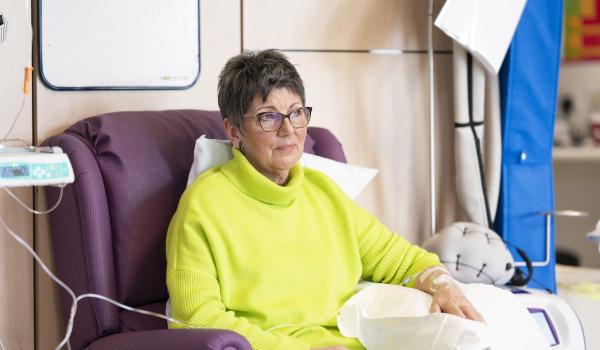The coronavirus (Covid-19) pandemic has had a significant impact on treatment and support for women with ovarian cancer, as well as significant delays in diagnosis, according to our new report: 'Voices of women with ovarian cancer: the coronavirus pandemic and its impact' [PDF].
We spoke to 61 women living with ovarian cancer to find out more about the specific challenges faced by the ovarian cancer community.
How can you help?
Earlier this year, many of you called on governments across the UK to act on early diagnosis as part of our It's time to TAKE OVAR campaign. Now it's more important than ever that early diagnosis remains on the agenda. We're asking you to email your elected representative to raise awareness of the symptoms of ovarian cancer, and encourage women to visit their GP if they think something is wrong.
It'll only take a few minutes and will save lives:
What are the challenges?
Early diagnosis saves lives. But, since the pandemic, the number of urgent referrals for suspected cancer have dropped by 60 per cent. We've heard from many women who are worried about visiting their GP with symptoms in case they come into contact with the virus, and for fear of overburdening the GP.
Over half of the women we surveyed (54 per cent) reported that treatment for their ovarian cancer had been disrupted. In particular, many women have been unable to access surgery.
Amy completed a round of chemotherapy just before lockdown was announced. She had been due to meet with her doctor to discuss the next steps in her treatment, but the meeting had to be cancelled. She said:
It felt like I was in limbo. I didn’t know what was coming next. I couldn't go into the hospital because it was too risky. I was left not knowing if I needed further treatment at this time, when it was going to start again, or even if it was going to start again.
Our report also found that over a quarter of women have been unable to access the care and support they received before the pandemic. At a time when many women are having to shield themselves from friends and family, this has left many women feeling extremely isolated. In fact, 80 per cent of women reported that the pandemic has had a negative effect on their mental or emotional wellbeing.
Annwen Jones OBE, Chief Executive of Target Ovarian Cancer, said:
It's hard to overstate the difficulties faced by women with ovarian cancer during this pandemic. We must not let them down as health services recover. It is urgent that we now see comprehensive plans and a timeline for the full restoration of diagnostic, treatment and support services, and awareness campaigns to encourage women to contact their GPs if they experience symptoms. This is the only way to avoid worse outcomes and a devastating mental toll on women.
What needs to be done?
We're calling on governments to act now to make sure ovarian cancer treatment and support can recover:
- We need a diagnostic recovery plan which includes an awareness campaign to encourage those with ovarian cancer symptoms to contact their GP, and a shorter diagnostic pathway in England, Wales and Northern Ireland with a CA125 blood test and ultrasound carried out at the same time.
- Treatment for ovarian cancer must restart as quickly and safely as possible, and protected treatment sites must be set up where surgery in particular can continue in the event of a second wave.
- Recovery plans should have a focus on support services, particularly psychological support, so that every woman with ovarian cancer has access to the best care.
Read the report: 'Voices of women with ovarian cancer: the coronavirus pandemic and its impact' [PDF].



